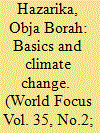| Srl | Item |
| 1 |
ID:
127531


|
|
|
| 2 |
ID:
112800


|
|
|
|
|
| Publication |
2012.
|
| Summary/Abstract |
There is a widespread perception that power is shifting in global politics and that emerging powers are assuming a more prominent, active and important role. This article examines the role of emerging powers such as China, India, Brazil and South Africa (BASIC) in climate change politics and the extent to which their rise makes the already difficult problem of climate change still more intractable-due to their rapid economic development, growing power-political ambitions, rising greenhouse gas emissions and apparent unwillingness to accept global environmental 'responsibility'. By reviewing the developments in global climate politics between the 1992 Rio Earth Summit and Rio+20, this article unsettles the image of a clear shift in power, stressing instead the complexity of the changes that have taken place at the level of international bargaining as well as at the domestic and transnational levels. Within this picture, it is important not to overestimate the shifts in power that have taken place, or to underplay the continued relevance of understanding climate change within the North-South frame. Emerging powers will certainly remain at the top table of climate change negotiations, but their capacity actively to shape the agenda has been limited and has, in some respects, declined. Even though emerging powers have initiated and offered greater action on climate change, both internationally and domestically, they have been unable to compel the industrialized world to take more serious action on this issue, or to stop them from unpicking several of the key elements and understandings of the original Rio deal. At the same time, developing world coalitions on climate change have also fragmented, raising questions about the continued potency of the 'global South' in future climate politics.
|
|
|
|
|
|
|
|
|
|
|
|
|
|
|
|
| 3 |
ID:
151004


|
|
|
|
|
| Summary/Abstract |
From the UNFCCC Copenhagen Climate Summit to the Paris Climate Summit, China has changed its position in global climate change talks in a substantive manner. There are three distinct drivers behind this change of strategy: domestic challenges of pollution, China’s search for an international leadership position on emerging issues and the US–China climate cooperation. This article looks at these three issues in detail.
|
|
|
|
|
|
|
|
|
|
|
|
|
|
|
|